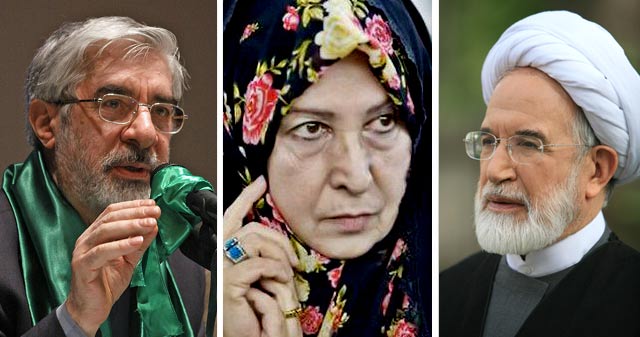
“1000 Days of Solitude: A Summary Report of the Detention of Green Movement Leaders”
The confinement of recognized leaders of the Green Movement, which formed after protesting the results of the presidential election, is considered one of the major challenges of the Islamic Republic government in the field of human rights, which after more than a thousand days, still remains unresolved; with the change of the new government in Iran, known as the moderate government, hopes for the release of the leaders of the Green Movement have increased more than ever before.
The confinement of the leaders of the Green Movement, along with their spouses, began after their call to gather on the 25th of Bahman 1389, with the siege of the home of these two high-ranking former officials of the Islamic Republic. This became more serious with the speech of Ahmad Jannati on the Friday prayer of the 29th of Bahman, and officially began on the first of Esfand of that year.
From the early days of the siege, a flood of critical positions and statements from human rights groups, political groups, and personalities began. The first days of the siege coincided with street protests on protest Wednesdays, one of the main demands of the protesters being the release of the leaders. In the midst of this, global protests against the siege of these two presidential candidates also began; a campaign that has not yet yielded results.
By suppressing the street protests, Mehdi Karroubi was transferred to a small apartment belonging to the Ministry of Intelligence, and with this relocation, Fatemeh Karroubi separated from her husband due to the problems of the new place and practically left the house arrest. After a few days, Mohammad Taghi Karroubi and the daughters of Mir Hossein Mousavi and Zahra Rahnavard were able to meet with their parents under special security measures.
Lack of access to fresh air and walking, detention or threat of children, prevention from attending ceremonies of close relatives, presence of officials in meetings, long-term prohibition of visitation, prohibition of visitation of certain family members, insulting and sometimes physically assaulting children during entry or exit from the place of confinement, spreading false news and reports by media close to the government about their health, restrictions and sometimes prevention of phone calls and limited access to books and media are among the most important violations of the rights of these three individuals during this period. In addition, the transfer of Mehdi Karroubi to the hospital was prevented three times, which has resulted in high blood pressure, vitamin D deficiency, lung infection, heart rhythm problems, joint pain, and knee arthritis. Furthermore, Mir Hossein Mousavi also suffered a severe heart condition once.
Until today, no one has taken responsibility for the siege, but with the emergence of the Hassan Rouhani government, talking about it is no longer taboo and the new challenge of the Rouhani government and the judicial system has created contradictory statements from judicial officials in response to this question.
Gholam Hossein Mohseni Ejei, the Attorney General of the country who had previously spoken about the restriction of movement and cutting off of telephone communications without confirmation of house arrest, and considered it to be in the best interest of himself, Mousavi, Karroubi, and Rahnavard, in his current discourse raises the issue of a type of “punishment” that is expected to continue. The Minister of Justice of the Hassan Rouhani government also stated that the case of the leaders of the Green Movement has been referred to the Supreme National Security Council. Although the statement of this government official proves the illegality of the house arrest, it has still created hopes among the supporters of Mir Hossein Mousavi and Mehdi Karroubi; because the head of the National Security Council is Hassan Rouhani and its secretary is Ali Shamkhani, the former Minister of Defense during the reform period.
According to Article 176 of the Iranian Constitution, one of the goals of the National Security Council is to determine defense and security policies within the framework of the overall policies set by the leadership; in other words, the implementation of any executive restrictions will be lifted if they are in conflict with the overall policies of the leader.
In such a painting, with regard to the promises of Mr. Hassan Rouhani and the implicit confirmation of these promises in his speech on December 7th, the hope of human rights activists and his supporters remains for the end of this process and the lifting of the house arrest of Mr. Mousavi, Mr. Karroubi, and Mrs. Rahnavard.

